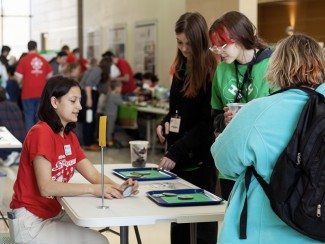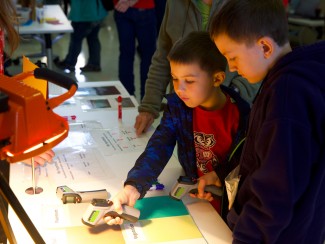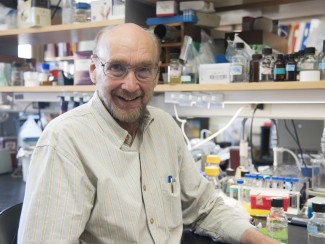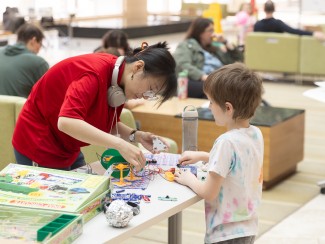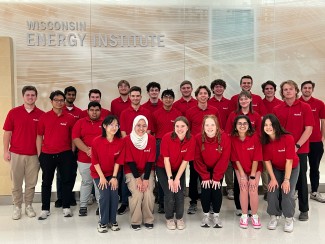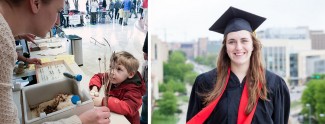
Rebecca (Becca) Fahney graduated from UW–Madison in the Fall of 2015. For the past two and a half years, Becca has supported education and outreach on behalf of the Wisconsin Energy Institute (WEI) and Great Lakes Bioenergy Research Center (GLBRC), first as a student, then as a temporary staff member. Next week, she begins a new job in the lab of Randy Jackson, GLBRC researcher and UW–Madison professor of agronomy, where she will help conduct research on ecosystem ecology, including helping to manage a new system of hybrid poplars that have been engineered to break down more easily into biomass for conversion into biofuels.
For the Kewaskum, Wis., native, UW–Madison wasn’t just a choice – it was the only college that mattered. While visiting her sister here while still in high school, Becca felt that UW–Madison was special, and she never looked back. In a heart-felt “exit interview”, we chatted with Becca about learning and growing as part of the WEI family.
You majored in conservation biology? Why?
I wandered my way through a lot of different majors and classes (I started as a business major, switched to anthropology, etc.) but I always liked my environmental classes the most. Conservation biology turned out to be the most flexible to my interests, but I still took a decent amount of business classes and wound up graduating with a certificate, allowing me to see how interesting it is to see how the two can work together.
The more I learn about the environment, the more I want to study it and see if there is something we can do to preserve it.
What did you learn working with Education and Outreach (E&O) staff?
E&O was awesome because I got to interact with everyone working on energy issues at UW–Madison, including at the GLBRC. I worked with microbiologists in Cameron Currie's lab, with geneticists in the Experimental Fermentation Lab and with electrical engineers in the High Bay lab, plus all of the amazing communications, business operations, IT, and building facilities people. I’ve really gotten to learn and see a lot of things I never would have if it wasn’t for my experiences at WEI/GLBRC, and that’s been amazing. I’ve gotten a broad overview of a lot of different things at once.
Best memory?
Last summer I spend awhile talking to a teacher who was here for the Bioenergy Institute for Educators who works on the East Coast, but had grown up around here. It was right when I was beginning to realize college was ending soon and I had no idea what I was doing next. We chatted about that feeling and how it related to her life, and it turned out she had an incredibly awesome story. This educator had a ton of experience doing basically everything – a Ph.D. in a hard sciences-field like microbiology or genetics and significant amount of time working in industry – but she ended up teaching, which at first seemed strange to me. But the more she talked about it, the more I could see how much she loves it. It made me realize that no matter how much of a plan I have for myself, I’ll never know when I’ll end up hating something and loving something else – we can’t always predict that kind of stuff.
Finally, what would you tell young people who have interests in the world but maybe don’t know how it’s all going to work out?
Becca: Well, that’s me.
MG: That is you.
Becca: You just wrote my biography.
MG: It was a curveball, yes.
Becca: Wellllll, I always tell myself that the only thing I can do is to keep working and talking to different people to learn more about myself and the world and that in the end it’ll figure itself out. And my parents are amazing people and will love me no matter what.

